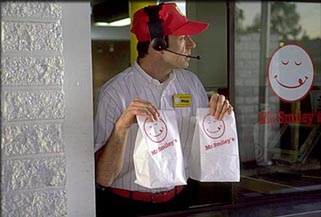|
|
Where Oscar Leads: Kevin SpaceyBy Daron AldridgeMay 19, 2009
To counteract the respectability of these films, Spacey sprinkled the resume with lightweight to god-awful fare, like Disney's Call of the Wild rip-off 1994's Iron Will on the kid-friendly side, and 1992's Consenting Adults, which was much more salaciously-titled than the end product would deliver. This discussion would be remiss if it didn't include a nod to possibly his greatest pre-Oscar role as Lloyd Chasseur in Christmas-themed The Ref. Spacey (and Judy Davis for that matter) stole every scene from the over-the-top, high volume Denis Leary as the last two people in the world you would want to kidnap. Go rent The Ref, even if it's just for the dinner scene and the moment when Lloyd grows a backbone. Let's move onward and upward to 1995, possibly the best year of Spacey's career, where he not only got critical acclaim, he creeped the bejesus out of $100 million worth of moviegoers. In late August of 1995, The Usual Suspects opened small and could have easily become a derivative Pulp Fiction clone. Instead, it boasted an impressive ensemble cast with no clear marquee names. As the titular characters, Kevin Pollak, Gabriel Byrne, Stephen Baldwin, Benicio del Toro and Spacey all delivered near-perfect performances but thanks to the well-crafted script, Spacey got the meatiest of these meaty roles and the attention of the AMPAS. That same fall, Se7en, a gritty and visceral serial killer film was released. Not only did Spacey not receive billing, he didn't even get listed in opening credits or on the poster at all. He has been credited with making such a request to avoid people waiting to see when and how he appears in the film. Regardless of the decision maker, this was a stroke of marketing genius that would be impossible in today's Internet-fueled world that contains just about any casting news or spoiler that you could want. For Se7en, that best kept secret played perfectly with the tone of the film. The audiences showed up for Brad Pitt but also got to see Spacey embody a character we really didn't want to think could exist.
[ View other columns by Daron Aldridge ]
[ View other Where Oscar Leads columns ]
[ Email this column ]
|

|
|
|

|
Thursday, October 31, 2024
© 2024 Box Office Prophets, a division of One Of Us, Inc.


